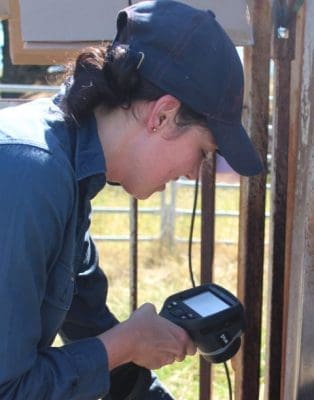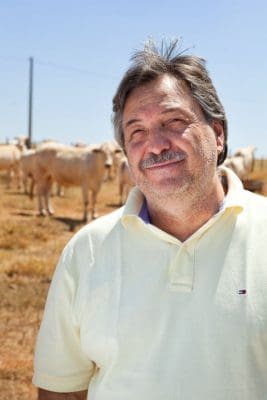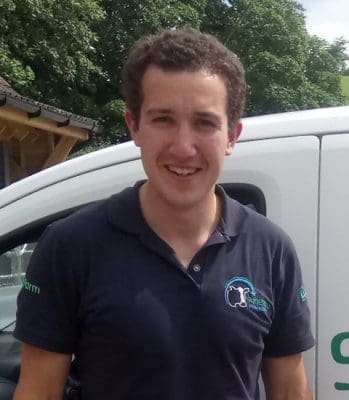Australian cattle pain relief lick block wins global research grant
September 24, 2018
Article by Beef Central
An Australian idea for a medicated lick block that allows cattle to self-administer pain relief has won a global animal welfare research grant.
Read the full article here
An Australian idea for a medicated lick block that allows cattle to self-administer pain relief has won a global animal welfare research grant.
The concept was one of three entries chosen from among 100 entries from 37 countries by Bayer for to receive a global Care4Cattle research grants.
Bayer launched the Care4Cattle initiative earlier this year in collaboration with the World Farmers’ Organisation (WFO) to reward new ways of advancing beef and dairy cattle well-being on farm.
A panel of five independent judges (listed below) selected the three winning projects from Australia, Brazil and the UK based on their viability, practical feasibility and potential to benefit the well-being of cattle globally.
The successful projects jointly receive the EUR 30,000 (AUD $48,000) Care4Cattle grant funding to further their research and innovation.
Practical solution for pain relief
 Dr Dominique van der Saag from Australia was selected for her research into novel ways in which calves could self-administer analgesia after standard husbandry procedures which can often cause animals stress both during and after.
Dr Dominique van der Saag from Australia was selected for her research into novel ways in which calves could self-administer analgesia after standard husbandry procedures which can often cause animals stress both during and after.
Dr Van der Saag and her Sydney University team of five created a simple idea to use medicated lick blocks, allowing the animals to receive a constant level of pain relief, in a way that limits the need to handle the animals; therefore improving their level of well-being.
“The repeated handling and treatment of animals can be detrimental to their well-being, so self-administration of analgesia, through for example, medicated lick blocks, has the potential for extended pain relief at the same time as reducing the stress these animals may feel.”
The grant will assist pain mitigation technology developer Medical Ethics and animal nutrition provider, 4 Season Company, to commence the first stage of the proof of concept studies.
Both companies have established a new collaboration to trial pain mitigation technologies via a unique feed supplement.
In a statement Medical Ethics said the research and development studies will involve incorporating a pain relief agent that is similar to human over-the-counter anti-inflammatory drugs, into a specially formulated feed supplement based on a unique molasses mineral block technology.
It said the technology that has the potential to deliver a range of pain mitigation therapies for livestock undergoing routine surgical procedure ssuch as castration, disbudding, and to assist in the recovery from other painful ailments such as hoof abscesses.
The technology also has the potential to help reduce pain and stress to cows during calving.
“Whilst the technology is still in the early stages this announcement was one of the company’s most significant animal wellbeing initiatives since the commercialisation of the Tri-Solfen pain mitigation technology,” Managing Director of Medical Ethics, Allan Giffard, said.
“The awarding of the prestigious Bayer grant to our research partners Sydney University indicates the enormous potential the technology has to improve animal wellbeing outcomes globally.
“Currently there are no products providing pain relief in a simple, accessible form for animals to self-medicate.
“The combination of the Tri-Solfen technology (protected by 35 patents globally) and the introduction of the pain mitigated infused feed supplement has the potential to provide a practical, cost efficient and highly effective pain mitigation combination.”
Improving weaning methods
 Professor Mateus Paranhos da Costa’s study into the effects different weaning methods can have on the well-being of beef calves was also granted funding.
Professor Mateus Paranhos da Costa’s study into the effects different weaning methods can have on the well-being of beef calves was also granted funding.
Based in Brazil, Professor Paranhos da Costa wants to research the impact varying methods of weaning could have on the stress the animal can feel.
By monitoring the weight gain of the calves throughout the process, the study will be able to see the impact each method has on the overall well-being of the calf. Ultimately, the team aims to be able to recommend appropriate weaning approaches for the benefit of the animals.
“The weaning method commonly used on beef cattle farms in Brazil has a negative impact on the well-being and productivity of cows and calves. With this project we aim to study the short and long-term effects of alternative weaning methods on cow-calf well-being and post-weaning performance,” Professor Paranhos da Costa said.
Equipping dairy farmers to better detect and manage lameness
 The third winning submission was from The Cattle Lameness Academy in the United Kingdom.
The third winning submission was from The Cattle Lameness Academy in the United Kingdom.
The team of veterinary experts educate and promote proactive discussions with farmers to help tackle the problem of lameness in cattle.
Their aim is to create a modular training platform using videos, where they can support farmers in dealing with the rising threat of lameness.
Such a tool will enable farmers to detect problems around lameness early, and equip them with the necessary know-how and practical support in order to address it.
Dr. Reuben Newsome, one of the veterinarians running and developing The Cattle Lameness Academy, highlighted the importance of helping farmers address this issue through training.
“The future of lameness in cattle is very worrying and it has to change, for the benefit of cattle well-being and farm productivity. We hope to provide farmers with the knowledge and expertise to address and overcome the challenge of lameness, therefore maintaining their place in sustainable agriculture,” he said.
Member of the Care4Cattle jury and former WFO Board Member, Ron Bonnett, said the number of applications received demonstrated that the well-being of cattle is of great interest and a priority among livestock professionals around the world.
“There were many good ideas that will make a difference to enhancing cattle well-being on the farm – each in their local context and environment.
This is promising and we hope that even more livestock professionals across the world will be inspired with new and innovative ways of caring for their cattle.”
The Care4Cattle Jury comprised:
Ron Bonnett, President, Canadian Federation of Agriculture & former World Farmer’s Organisation board member
Francisco Galindo, Professor, National Autonomous University of Mexico & Coordinator, OIE Collaborating Centre on Animal Welfare
Ruaraidh Petre, Executive Director, Global Roundtable for Sustainable Beef
Xavier Manteca, Professor, Department of Animal and Food Science, School of Veterinary Science, Universitat Autònoma de Barcelona
Carmen Gallo, Animal Welfare Group, Facultad de Ciencias Veterinarias, Universidad Austral de Chile
Source: Bayer, Medical Ethics



